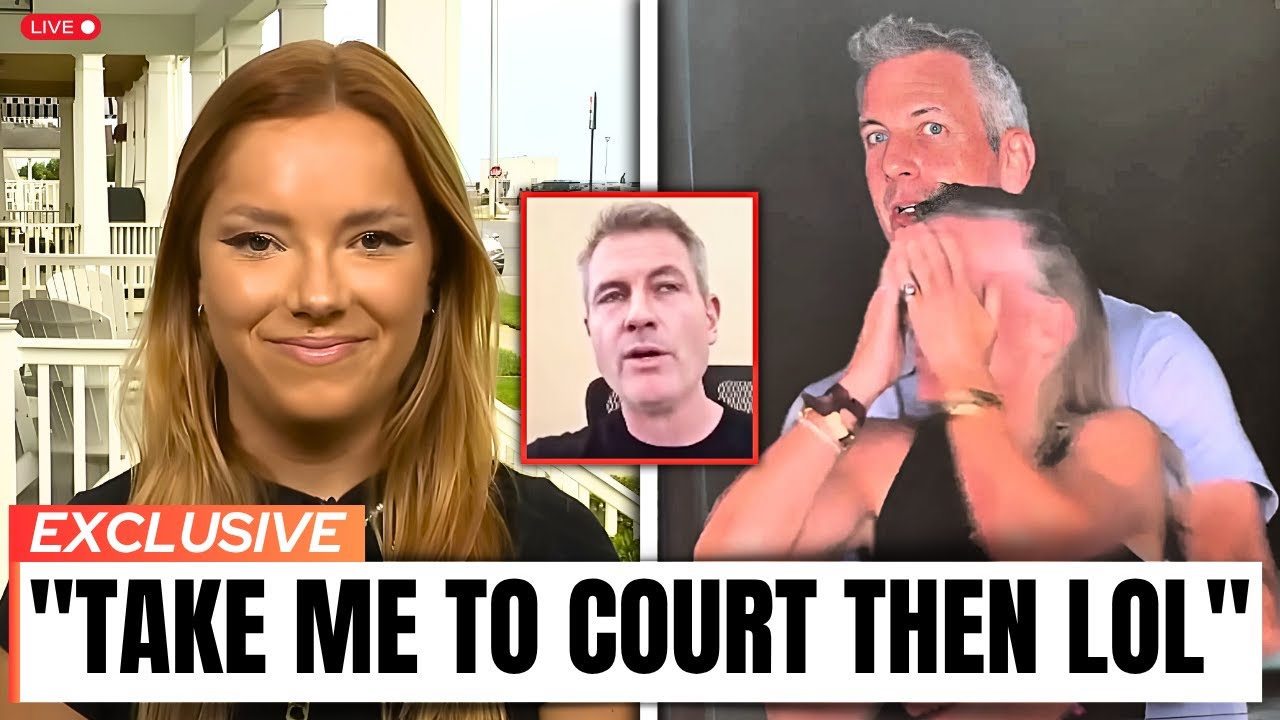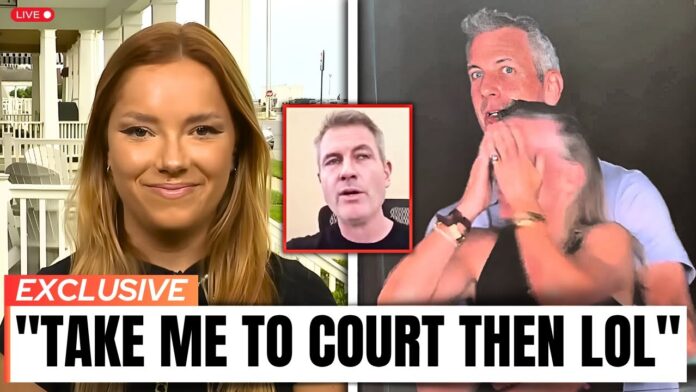😱 “I Don’t Fear Him” – Girl Behind Viral Coldplay Kiss Cam Video BREAKS SILENCE After CEO Andy Byron Threatens to Sue Her?! A fan’s innocent recording sparks a legal war, exposing hidden threats and defiance. What bombshells did she drop?

The Coldplay Kiss Cam Scandal’s Latest Drama: The Fan Who Filmed It Breaks Silence Amid Lawsuit Threats from CEO Andy Byron
The Coldplay concert at Gillette Stadium on July 16, 2025, promised an evening of uplifting anthems and crowd-pleasing antics, but for one unsuspecting fan, it became the starting point of a personal nightmare. Emily Harper, a 28-year-old marketing assistant from Boston, captured the now-infamous kiss cam moment featuring Astronomer CEO Andy Byron and Chief People Officer Kristin Cabot in an intimate embrace. Her video, posted casually on TikTok, exploded virally, amassing millions of views and igniting a scandal that led to resignations and endless speculation. Now, amid rumors that Byron is threatening to sue her for invasion of privacy, Harper has broken her silence, defiantly stating, “I don’t fear him.” As of August 4, 2025, no lawsuit has been filed in Massachusetts courts, but the unverified claims have sent shockwaves through social media. This article explores Harper’s story, the escalating threats, the scandal’s ripple effects, and the broader questions about privacy, fan culture, and corporate power in the digital era.
Emily Harper’s involvement began innocently enough. Seated a few rows behind Byron and Cabot, she was enjoying Coldplay’s Music of the Spheres tour when the band’s signature kiss cam lit up the jumbotron. As lead singer Chris Martin scanned the crowd, the camera landed on the executives, capturing their awkward hug and Martin’s quip: “Either they’re having an affair or they’re just very shy.” Harper, phone in hand like thousands of others, recorded the moment for her social media followers, captioning it “Coldplay chaos!” with laughing emojis. Little did she know, her 15-second clip would unravel careers and thrust her into the spotlight as the “girl behind the viral video.”
The video’s virality was instantaneous. Shared across TikTok, X, and Instagram, it garnered over 50 million views in the first 48 hours. Online sleuths quickly identified Byron and Cabot through LinkedIn profiles and concert photos, turning a lighthearted concert gimmick into a full-blown affair scandal. Astronomer, the Cincinnati-based tech firm valued at over $1 billion, launched an internal investigation, citing potential workplace policy violations. Byron resigned first, followed by Cabot on July 24, 2025. Public sightings fueled the drama: Cabot without her wedding ring, gardening somberly at her $2.2 million Rye, New Hampshire, home; Byron’s wife, Megan, removing his last name from her social media.
Harper watched the fallout with growing unease. Initially thrilled by the video’s popularity—her follower count surged from 5,000 to over 100,000—she soon faced backlash. Trolls accused her of invading privacy, while supporters hailed her as an unwitting whistleblower. Then came the alleged threats. According to Harper’s interview with a local Boston podcast on July 30, 2025, she received a cease-and-desist letter from Byron’s legal team, demanding she remove the video and pay damages for “emotional distress and reputational harm.” The letter, which Harper shared screenshots of on her Instagram (later deleted), warned of a potential lawsuit if she didn’t comply. “I was terrified at first,” Harper admitted. “But then I thought, why should I be scared? I was just filming a public event like everyone else.”
Her defiant statement—”I don’t fear him”—came during the podcast, where she broke her silence after days of online speculation. Harper explained that the threats felt like bullying from a powerful CEO trying to silence a regular fan. “He’s a big-shot executive, and I’m just a girl who loves Coldplay,” she said. “If he sues me, let him. I didn’t do anything wrong.” The interview went viral, with clips shared across YouTube and X, amplifying the narrative of David vs. Goliath. Hashtags like #StandWithEmily and #ColdplayFanFightBack trended, drawing support from celebrities and influencers who decried corporate overreach.
Byron’s side remains murky. Sources close to the former CEO, speaking anonymously to gossip outlets, claim the lawsuit threat is about protecting his privacy, not intimidation. Legal experts, however, doubt its viability. In Massachusetts, where the concert occurred, public events like concerts offer limited privacy expectations. “Filming in a stadium with 60,000 people isn’t an invasion,” one attorney told a news outlet. “Byron would have zero grounds—it’s dead on arrival.” Despite this, rumors persist that Byron is exploring suits against Coldplay, the venue, or even Martin for his on-stage comment, citing emotional distress. No filings appear in public records as of August 4, 2025, but the mere threat has chilled fan sharing at events.
The scandal’s origins trace back to the kiss cam itself—a staple of sports and concerts designed for fun. Coldplay’s version, part of their interactive shows, has featured celebrities before, but never with such repercussions. Martin, in subsequent performances, has joked about the cameras, warning fans: “Be careful what you do— it might go viral!” This nod underscores the unintended consequences of modern entertainment, where smartphones turn audiences into inadvertent paparazzi.
For Harper, the experience has been a rollercoaster. A self-described “normal girl” who works in digital marketing and attends concerts as a hobby, she never imagined her video would cost jobs or spark legal drama. “I feel bad for the people involved,” she said in her interview. “But I didn’t expose an affair—I just captured a funny moment.” The threats, however, have taken a toll. Friends report Harper has received hate mail and doxxing attempts, prompting her to privatize her accounts temporarily. Yet, her defiance has earned her a new fanbase, with offers for interviews and even a potential book deal floating around unverified reports.
The broader implications touch on privacy in the digital age. In an era where everyone is a content creator, what constitutes fair game? Concerts, once private escapes, are now broadcast globally via fan videos. Legal precedents, like those from paparazzi cases, suggest public figures have diminished privacy rights, but everyday fans like Harper aren’t equipped to handle lawsuits from the elite. Byron, as a C-suite executive, wields power that amplifies the imbalance—his net worth, bolstered by Astronomer’s $93 million funding round, dwarfs Harper’s resources.
Corporate fallout continues at Astronomer. The company, scrambling post-resignations, appointed interim leadership and emphasized its commitment to ethical conduct. Ex-employees, posting anonymously on forums, describe a toxic culture under Byron, with whispers of favoritism toward Cabot predating the scandal. Leaks suggest internal Slack messages and office rumors of their closeness, adding credence to affair speculations. Cabot’s husband, Andrew, remains silent, though divorce rumors swirl amid their shared Rye property and mortgage.
Social media’s role as amplifier and judge is central. Platforms like TikTok democratize fame but perpetuate misinformation. Harper’s video spawned memes, deep dives, and conspiracy theories—some claiming the kiss cam was staged, others alleging company cover-ups. YouTube videos with titles mirroring the scandal’s twists rack up views, blending fact with fiction. The “I don’t fear him” quote has become a rallying cry, symbolizing resistance against powerful figures.
Psychologically, the toll on all parties is evident. Harper’s breakdown from fear to defiance mirrors the emotional whiplash of viral fame. Byron, once a tech visionary, now faces a tarnished reputation and marital strain. Cabot navigates public humiliation, her HR expertise ironically undermined by the very policies she enforced. The scandal echoes past viral moments, like the 2023 “Try That in a Small Town” backlash or celebrity concert mishaps, where fans inadvertently spark controversies.
As August 2025 progresses, the lawsuit threat looms unresolved. Harper has lawyered up with pro bono help from a civil rights firm, preparing for any escalation. Byron’s camp denies aggressive tactics, framing the letter as standard procedure. Coldplay, meanwhile, continues touring, with Martin steering clear of direct comments.
In the end, Emily Harper’s story transforms the Coldplay kiss cam scandal from tabloid fodder to a tale of empowerment. Her words—”I don’t fear him”—resonate as a stand against intimidation, reminding us that in the smartphone era, one video can challenge empires. Whether Byron sues or backs down, this chapter underscores the precarious line between public spectacle and personal privacy, where fans hold the power—and the peril.
